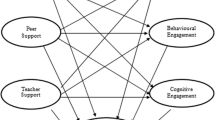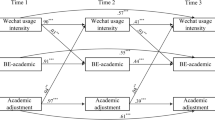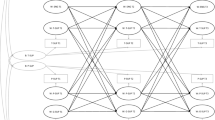Abstract
Online student engagement plays a very essential role in the improvement of academic achievements. However, the role of school support in the relationship between online student engagement and academic achievements remain uncertain; whether its impact was different during and after the COVID-19 pandemic is also still being determined. Therefore, the present study conducted a questionnaire survey among 825 Chinese college students during the COVID-19 pandemic and 751 after the COVID-19 pandemic, aiming to examine the correlation between online student engagement and academic achievements, as well as the moderating influence of school support. The results showed that online student engagement had a significant predictive effect on college students’ academic achievements during and after the COVID-19 pandemic. Furthermore, school support was found to moderate the relationship between online student engagement and college students’ academic achievements only during the COVID-19 pandemic. The results indicated that the more school support the college students received, the stronger the effect of online student engagement on academic achievements during the COVID-19 pandemic. The research results provide empirical evidence for the moderation of school support in the relationship between online student engagement and college students’ academic achievements.

Similar content being viewed by others
Data availability
The data that support the findings of this study are available from the corresponding author upon request.
References
Adedoyin, O. B., & Soykan, E. (2023). Covid-19 pandemic and online learning: The challenges and opportunities. Interactive Learning Environments, 31(2), 863–875. https://doi.org/10.1080/10494820.2020.1813180
Adi Sucipto, T. L., Efendi, A., Hanif, H. N., & Budiyanto, C. (2017). The influence of learning management technology to student’s learning outcome. IJPTE International Journal of Pedagogy and Teacher Education, 1(1), 11–18. https://doi.org/10.20961/ijpte.v1i1.4606
Azevedo, J. P., Hasan, A., Goldemberg, D., Geven, K., & Iqbal, S. A. (2021). Simulating the potential impacts of COVID-19 school closures on schooling and learning outcomes: A set of global estimates. The World Bank Research Observer, 36(1), 1–40. https://doi.org/10.1093/wbro/lkab003
Burns, E. C., Martin, A. J., & Collie, R. J. (2020). Supporting and thwarting interpersonal dynamics and student achievement: A multi-level examination of PISA 2015. International Journal of Research & Method in Education, 43(4), 364–378. https://doi.org/10.1080/1743727X.2020.1757639
Caskurlu, S., Maeda, Y., Richardson, J. C., & Lv, J. (2020). A meta-analysis addressing the relationship between teaching presence and students’ satisfaction and learning. Computers & Education, 157, 103966. https://doi.org/10.1016/j.compedu.2020.103966
Chen, B. B., Wiium, N., Dimitrova, R., & Chen, N. (2019). The relationships between family, school and community support and boundaries and student engagement among Chinese adolescents. Current Psychology, 38(3), 705–714. https://doi.org/10.1007/s12144-017-9646-0
Chen, L., & Huang, J. H. (2023). Perceived school support and online learning outcomes among Chinese college students: The serial mediating role of academic self-efficacy and online learning engagement. Educational Research and Reviews, 18(10), 269–280. https://doi.org/10.5897/ERR2023.4359
Chiu, T. K. (2023). Student engagement in K-12 online learning amid COVID-19: A qualitative approach from a self-determination theory perspective. Interactive Learning Environments, 31(6), 3326–3339. https://doi.org/10.1080/10494820.2021.1926289
Deci, E. L., & Ryan, R. M. (Eds.). (2004). Handbook of self-determination research. University Rochester Press.
Deci, E. L., & Ryan, R. M. (Eds.). (2013). Intrinsic motivation and self-determination in human behavior. Springer.
Despoti, G., Kokkinos, C. M., & Fanti, K. A. (2021). Bullying, victimization, and psychopathy in early adolescents: The moderating role of social support. European Journal of Developmental Psychology, 18(5), 747–764. https://doi.org/10.1080/17405629.2020.1858787
Dumford, A. D., & Miller, A. L. (2018). Online learning in higher education: Exploring advantages and disadvantages for engagement. Journal of Computing in Higher Education, 30, 452–465. https://doi.org/10.1007/s12528-018-9179-z
Fredricks, J. A., Blumenfeld, P. C., & Paris, A. H. (2004). School engagement: Potential of the concept, state of the evidence. Review of Educational Research, 74(1), 59–109. https://doi.org/10.3102/00346543074001059
García-Morales, V. J., Garrido-Moreno, A., & Martín-Rojas, R. (2021). The transformation of higher education after the COVID disruption: Emerging challenges in an online learning scenario. Frontiers in Psychology, 12, 616059. https://doi.org/10.3389/fpsyg.2021.616059
Ge, X. (2021). Emotion matters for academic success: Implications of the Article by Jarrell, Harley, Lajoie, and Naismith (2017) for creating nurturing and supportive learning environments to help students manage their emotions. Educational Technology Research and Development, 69(1), 67–70. https://doi.org/10.1007/s11423-020-09925-8
Gherheş, V., Stoian, C. E., Fărcaşiu, M. A., & Stanici, M. (2021). E-learning vs. face-to-face learning: Analyzing students’ preferences and behaviors. Sustainability, 13(8), 4381. https://doi.org/10.3390/su13084381
González, C., Ponce, D., & Fernández, V. (2023). Teachers’ experiences of teaching online during COVID-19: Implications for postpandemic professional development. Educational Technology Research and Development, 71(1), 55–78. https://doi.org/10.1007/s11423-023-10200-9
Han, W. J., & Bridglall, B. L. (2009). Assessing school supports for ELL students using the ECLS-K. Early Childhood Research Quarterly, 24(4), 445–462. https://doi.org/10.1016/j.ecresq.2009.08.003
Hrastinski, S. (2009). A theory of online learning as online participation. Computers & Education, 52(1), 78–82. https://doi.org/10.1016/j.compedu.2008.06.009
Hu, M., & Li, H. (2017). Student engagement in online learning: A review. In 2017 International symposium on educational technology (ISET) (pp. 39–43). IEEE.
Huh, S., Shen, X., Wang, D., & Lee, K. Y. (2022). Korean and Chinese University EFL learners’ perceptions of and attitudes toward online and face-to-face lectures during COVID-19. English Teaching, 77(1), 67–92. https://doi.org/10.15858/engtea.77.1.202203.67
IESALC-UNESCO. (2022). Resuming or reforming? Tracking the global impact of the COVID-19 pandemic on higher education after two years of disruption. Instituto Internacional de la UNESCO para la Educación Superior en América Latina y el Caribe Issue. https://redined.educacion.gob.es/xmlui/handle/11162/239323
Imran, R., Fatima, A., Salem, I. E., & Allil, K. (2023). Teaching and learning delivery modes in higher education: Looking back to move forward post-COVID-19 era. The International Journal of Management Education, 21(2), 100805. https://doi.org/10.1016/j.ijme.2023.100805
Jamilah, J., & Fahyuni, E. F. (2022). The future of online learning in the post-COVID-19 era. KnE Social Sciences. https://doi.org/10.18502/kss.v7i10.11251
Jia, C., Hew, K. F., Jiahui, D., & Liuyufeng, L. (2023). Towards a fully online flipped classroom model to support student learning outcomes and engagement: A 2-year design-based study. The Internet and Higher Education, 56, 100878. https://doi.org/10.1016/j.iheduc.2022.100878
Kiefer, S. M., Alley, K. M., & Ellerbrock, C. R. (2015). Teacher and peer support for young adolescents’ motivation, engagement, and school belonging. RMLE Online, 38(8), 1–18. https://doi.org/10.1080/19404476.2015.11641184
Kuh, G. D. (2009). The National Survey of Student Engagement: Conceptual and empirical foundations. New Directions for Institutional Research, 2009(141), 5–20. https://doi.org/10.1002/ir.283
Li, J., Yang, D., & Hu, Z. (2022). Wuhan college students’ self-directed learning and academic performance: Chain-mediating roles of optimism and mental health. Frontiers in Psychology, 12, 6597. https://doi.org/10.3389/fpsyg.2021.757496
Li, X. Y., Yang, N., & Liu, Z. Y. (2016). The constituent factors of college students’ academic achievement sand its empirical research-taking local ordinary colleges and universities as an example. Educational Research, 37(10), 78–86.
Madigan, D. J., & Curran, T. (2021). Does burnout affect academic achievement? A meta-analysis of over 100,000 students. Educational Psychology Review, 33, 387–405. https://doi.org/10.1007/s10648-020-09533-1
Martin, F., & Bolliger, D. U. (2018). Engagement matters: Student perceptions on the importance of engagement strategies in the online learning environment. Online Learning Journal, 22(1), 205–222. https://doi.org/10.24059/olj.v22i1.1092
Ministry of Education of the People’s Republic of China. (2023a). Notice of the General Office of the Ministry of Education on the Selection of National Online Excellence Courses for Vocational Education in 2023. Retrieved January 10, 2024, from http://www.moe.gov.cn/srcsite/A07/moe_953/202312/t20231229_1096646.html
Ministry of Education of the People’s Republic of China. (2023b). Contributing China’s wisdom to the World’s Digital Education—inspiration of the “National Wisdom Education Platform” Project Winning the UNESCO Prize for Informatisation in Education. Retrieved January 10, 2024, from http://www.moe.gov.cn/jyb_xwfb/s5147/202309/t20230914_1080237.html
Mishra, L., Gupta, T., & Shree, A. (2020). Online teaching-learning in higher education during lockdown period of COVID-19 pandemic. International Journal of Educational Research Open, 1, 100012. https://doi.org/10.1016/j.ijedro.2020.100012
Moreira, P. A., & Lee, V. E. (2020). School social organization influences adolescents’ cognitive engagement with school: The role of school support for learning and of autonomy support. Learning and Individual Differences, 80, 101885. https://doi.org/10.1016/j.lindif.2020.101885
Mushtaque, I., Rizwan, M., Dasti, R. K., Ahmad, R., & Mushtaq, M. (2021). Students’ attitude and impact of online learning: Role of teachers and classmate support during the Covid-19 crisis. Performance Improvement, 60(5), 20–27. https://doi.org/10.1002/pfi.21982
Nabizadeh, S., Hajian, S., Sheikhan, Z., & Rafiei, F. (2019). Prediction of academic achievement based on learning strategies and outcome expectations among medical students. BMC Medical Education, 19, 1–11. https://doi.org/10.1186/s12909-019-1527-9
Panigrahi, R., Srivastava, P. R., & Sharma, D. (2018). Online learning: Adoption, continuance, and learning outcome—A review of literature. International Journal of Information Management, 43(12), 1–14. https://doi.org/10.1016/j.ijinfomgt.2018.05.005
Pintrich, P. R. (2004). A conceptual framework for assessing motivation and self-regulated learning in college students. Educational Psychology Review, 16(4), 385–407. https://doi.org/10.1007/s10648-004-0006-x
Podsakoff, P. M., MacKenzie, S. B., Lee, J. Y., & Podsakoff, N. P. (2003). Common method biases in behavioral research: A critical review of the literature and recommended remedies. Journal of Applied Psychology, 88(5), 879–903. https://doi.org/10.1037/0021-9010.88.5.879
Rashid, S., & Yadav, S. S. (2020). Impact of Covid-19 pandemic on higher education and research. Indian Journal of Human Development, 14(2), 340–343. https://doi.org/10.1177/0973703020946700
Ryan, R. M., & Deci, E. L. (2000). Self-determination theory and the facilitation of intrinsic motivation, social development, and well-being. American Psychology, 55(1), 68–78. https://doi.org/10.1037/0003-066X.55.1.68
Shin, H., & Chang, Y. (2022). Relational support from teachers and peers matters: Links with different profiles of relational support and academic engagement. Journal of School Psychology, 92, 209–226. https://doi.org/10.1016/j.jsp.2022.03.006
Song, P., & Karako, T. (2021). The strategy behind Japan’s response to COVID-19 from 2020–2021 and future challenges posed by the uncertainty of the Omicron variant in 2022. BioScience Trends, 15(6), 350–352. https://doi.org/10.5582/bst.2021.01560
Sun, J. C. Y., & Rueda, R. (2012). Situational interest, computer self-efficacy and self-regulation: Their impact on student engagement in distance education. British Journal of Educational Technology, 43(2), 191–204. https://doi.org/10.1111/j.1467-8535.2010.01157.x
The Education Department of Hainan Province. (2016). The Education Department of Hainan Province on the convening of the “Hainan Provincial Universities Curriculum Sharing Alliance” inaugural meeting of the notice. Retrieved January 9, 2024, from http://edu.hainan.gov.cn/edu/0400/201603/3be3aafbc00f4d73aaa3abc5ef2c5cc9.shtml
Thoits, P. A. (2011). Mechanisms linking social ties and support to physical and mental health. Journal of Health and Social Behavior, 52(2), 145–161. https://doi.org/10.1177/0022146510395592
Tinto, V. (1997). Classrooms as communities: Exploring the educational character of student persistence. The Journal of Higher Education, 68(6), 599–623. https://doi.org/10.1080/00221546.1997.11779003
Torsheim, T., Wold, B., & Samdal, O. (2000). The teacher and classmate support scale: Factor structure, test-retest reliability and validity in samples of 13-and 15-year-old adolescents. School Psychology International, 21(2), 195–212. https://doi.org/10.1177/0143034300212006
United Nations Educational, Scientific and Cultural Organization (UNESCO). (2020). Global monitoring of school closures caused by COVID-19. Retrieved May 2, 2021, from https://en.unesco.org/covid19/educationresponse
Voitsidis, P., Nikopoulou, V. A., Holeva, V., Parlapani, E., Sereslis, K., Tsipropoulou, V., Karamouzi, P., Giazkoulidou, A., Tsopaneli, N., & Diakogiannis, I. (2021). The mediating role of fear of COVID-19 in the relationship between intolerance of uncertainty and depression. Psychology and Psychotherapy: Theory, Research and Practice, 94(3), 884–893. https://doi.org/10.1111/papt.12315
Wang, C., Mirzaei, T., Xu, T., & Lin, H. (2022). How learner engagement impacts non-formal online learning outcomes through value co-creation: An empirical analysis. International Journal of Educational Technology in Higher Education, 19(1), 1–26. https://doi.org/10.1186/s41239-022-00341-x
Wang, T., Lin, C. L., & Su, Y. S. (2021). Continuance intention of university students and online learning during the COVID-19 pandemic: A modified expectation confirmation model perspective. Sustainability, 13(8), 4586. https://doi.org/10.3390/su13084586
Yang, D., Lavonen, J. M., & Niemi, H. (2018). Online learning engagement: Factors and results-evidence from literature. Themes in eLearning, 11(1), 1–22.
You, W. (2022). Research on the relationship between learning engagement and learning completion of online learning students. International Journal of Emerging Technologies in Learning (iJET), 17(1), 102–117. https://doi.org/10.3991/ijet.v17i01.28545
Yu, J., Huang, C., He, T., Wang, X., & Zhang, L. (2022a). Investigating students’ emotional self-efficacy profiles and their relations to self-regulation, motivation, and academic performance in online learning contexts: A person-centered approach. Education and Information Technologies, 27(8), 11715–11740. https://doi.org/10.1007/s10639-022-11099-0
Yu, X., Wang, Y., & Liu, F. (2022b). Language learning motivation and burnout among English as a foreign language undergraduates: The moderating role of maladaptive emotion regulation strategies. Frontiers in Psychology, 13, 808118. https://doi.org/10.3389/fpsyg.2022.808118
Zapata-Cuervo, N., Montes-Guerra, M. I., Shin, H. H., Jeong, M., & Cho, M. H. (2023). Students’ psychological perceptions toward online learning engagement and outcomes during the COVID-19 pandemic: A comparative analysis of students in three different countries. Journal of Hospitality & Tourism Education, 35(2), 108–122. https://doi.org/10.1080/10963758.2021.1907195
Zhang, J., Fu, M., Xin, Y., Chen, P., & Sha, S. (2020). The development of creativity in senior primary school students: Gender differences and the role of school support. Acta Psychologica Sinica, 52(9), 1057–1070. https://doi.org/10.3724/SP.J.1041.2020.01057
Zysberg, L., & Schwabsky, N. (2021). School climate, academic self-efficacy and student achievement. Educational Psychology, 41(4), 467–482. https://doi.org/10.1080/01443410.2020.1813690
Acknowledgements
We sincerely thank all participants for their valuable contributions to this study. We also extend our gratitude to our collaborators for their support and expertise.
Funding
This study received no funding.
Author information
Authors and Affiliations
Contributions
LC and JL drafted the manuscript. SG served as the research advisor. LC, JL, YP, and SG contributed significantly to the conception, the data analysis, and manuscript revision. LC collected the data.
Corresponding author
Ethics declarations
Conflict of interest
No potential conflict of interest was reported by the authors.
Ethical Approval
All procedures performed in the present study involving participants were in accordance with the ethical standards of the institutional research committee of Hainan Technology and Business College (Program No. HGS-2022-05, HGS-2023-03).
Consent to Participate
All participants agreed to participate in this survey.
Consent for Publication
All authors contributed to the article and approved the submitted version.
Additional information
Publisher's Note
Springer Nature remains neutral with regard to jurisdictional claims in published maps and institutional affiliations.
Appendices
Appendix 1: Online Student Engagement Scale
Dimension | Number | Item |
|---|---|---|
Behavioral engagement | BE1 | I follow the rules of the online class 我遵守线上课程的纪律。 |
BE2 | I complete my homework on time 我按时完成作业。 | |
BE3 | I check my schoolwork for mistakes 我认真检查作业是否有误。 | |
Emotional engagement | EE1 | I like taking the online class 我喜欢上线上课程。 |
EE2 | I feel excited by my work at the online class 上线上课程时我很兴奋。 | |
EE3 | The online classroom is a fun place to be 线上课程很有趣。 | |
EE4 | I am interested in the work at the online class 我对线上课程的内容很感兴趣。 | |
EE5 | I feel happy when taking online class 上线上课程让我开心。 | |
EE6 | I talk with people outside of school about what I am learning in the online class 我会跟校外的朋友谈论我在线上课程的所学到的东西。 | |
Cognitive engagement | CE1 | I study at home even when I do not have a test 即使没有考试, 我也是在家自学。 |
CE2 | I try to look for some course-related information on other resources, such as television, journal papers, and magazines 我尽力在电视、周刊、杂志等资源上寻找课程相关的资料。 | |
CE3 | When I read the course materials, I ask myself questions to make sure I understand what it is about 当我阅读课程材料时, 我都会采用自问自答的方式确保自己对课程内容的理解。 | |
CE4 | I read extra materials to learn more about things we do in the online class 我会结合线上课程内容, 多阅读相关课外材料。 | |
CE5 | If I do not know about a concept when I am learning in the online class, I do something to figure it out 在线上课程入到不明白的概念问题, 我会努力弄明白。 |
Appendix 2: School Support Scale
Dimension | Number | Item |
|---|---|---|
Teacher support | TS1 | Our teachers treat us fairly 老师们对待我们很公平。 |
TS2 | When I need extra help, I can get it 当我需要额外的帮助时, 老师会伸出援手。 | |
TS3 | My teachers are interested in me as a person 老师对我的为人很感兴趣。 | |
TS4 | Our teachers are nice and friendly 我的老师们很友好。 | |
Classmate support | CS1 | The students in my class enjoy being together 我班上的同学们很喜欢待在一起。 |
CS2 | Most of the students in my class are kind and helpful 我班上大部分的同学都很友好且乐于助人。 | |
CS3 | Other students accept me as I am 其他同学接受我的真性情。 | |
CS4 | When a classmate is upset, other students comfort him/her 如有同学不开心了, 其他同学都会来安慰他/她。 |
Appendix 3: Academic Achievement Scale
Dimension | Number | Item |
|---|---|---|
Learning recognition | LR1 | 我可以灵活运用所学知识。 I can make use of what I’ve learnt freely |
LR2 | 我能迅速抓住解决问题的关键。 I could quickly get the key points of the solutions | |
LR3 | 我总是能够很快理解新知识, 新技能。 I could always understand new knowledge and skills quickly | |
Communication | CN1 | 我能清楚地与人交流。 I could communicate with others clearly |
CN2 | 我善于倾听, 不喜欢打断别人。 I am willing to listening but interrupting others | |
CN3 | 我害怕与别人面对面交流。 I’m afraid of communicating with others face to face | |
Self-management | SM1 | 不管什么计划不计划的, 我想学习的时候才学习。 I study when I’d love to regardless of plans |
SM2 | 谈不上什么目标不目标, 一切顺其自然。 Let everything with the flow and don’t talking about goals | |
SM3 | 我经常会因为偷懒而耽误计划。 I always hold up plans because of laziness | |
Interpersonal promotion | IP1 | 我总是主动给予其他同学帮助。 I always willing to offer help to other classmates |
IP2 | 我能够很好地关心体贴其他同学。 I could take good care of other classmates | |
IP3 | 在不同的场合, 我能够很好地约束自己的行为。 I could restrict my own behavior on different occasions | |
IP4 | 我能够与其他同学很好的合作。 I could cooperate well with other classmates | |
IP5 | 我能够与其他人相处融洽。 I could get along well with others |
Rights and permissions
Springer Nature or its licensor (e.g. a society or other partner) holds exclusive rights to this article under a publishing agreement with the author(s) or other rightsholder(s); author self-archiving of the accepted manuscript version of this article is solely governed by the terms of such publishing agreement and applicable law.
About this article
Cite this article
Chen, L., Li, J., Pan, Y. et al. School Support, Online Student Engagement, and Academic Achievements During and After the COVID-19 Pandemic: A Survey from China. Asia-Pacific Edu Res (2024). https://doi.org/10.1007/s40299-024-00941-3
Accepted:
Published:
DOI: https://doi.org/10.1007/s40299-024-00941-3




